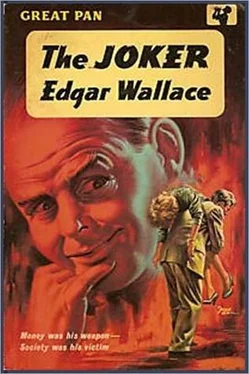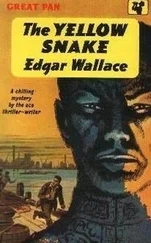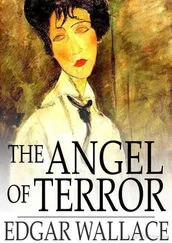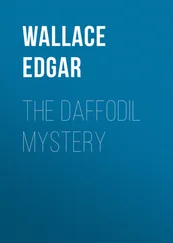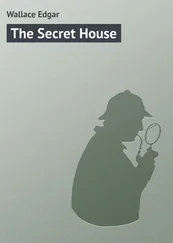Mr Ellenbury performed a rapid calculation, consulting a little ready reckoner.
‘Right,’ he said. ‘You have strangely perverted principles, my friend. Whether a man steals ten cents or five million dollars—’
‘Bank of Yokohama’—the manager sorted his papers. ‘The yen is at 179, that’s a drop. Curious! Way down in the bowels of the earth a ledge of rock slips over, a superheated packet of steam blows up, and the effect on the money market is disastrous! There is a lot of earthquake in Harlow: he has got into the Acts of God class—I’m giving you dollars for this—US dollars.’
‘Quite OK,’ said Mr Ellenbury, checking the bundles that were handed to him.
It was growing dark when he carried out his suitcases and placed them inside the car. They were very heavy. It was strange how heavy paper money could be—and how bulky.
He drove to his office in Theobald’s Road and was glad that many years before, when offered the choice between a small suite on the ground floor and a larger one on the first floor, he had chosen the former.
He had sent his clerk home early. It was a Friday and the man had been given a fortnight’s holiday and had had his salary in advance. Opening the outer door with his key, he tugged the two suitcases into his private room. Here was a brand-new trunk and a passport. A few weeks before, Harlow had ordered him to procure a passport for a ‘Mr Jackson,’ whose other name was Ingle. Ellenbury had a distaste for the petty frauds of life, but as usual he had obeyed and duplicated the offence by applying for a second passport, forwarding a photograph of himself taken twenty years before and applying in a name which had not the faintest resemblance to his own.
He sat down with the two bulging grips before him and with a feeling of growing unease. Not that his conscience was troubling him. The bedridden Mrs Ellenbury never once entered his mind; the injustice he was doing to his employer, if it occurred to him at all, was a relief to his distress.
The weight and the bulk of the paper money…
The Customs would search his suitcase at Calais or Havre, and the money would attract attention. He might put it at the bottom of the trunk and register it through. But the thefts of baggage on the French railways were notoriously frequent. He might, of course, travel by the Simplon Express or by the Blue Train—hand baggage was subject to a perfunctory examination on the train, and if he were bound for Monte Carlo the carriage of such wealth might be regarded as an act of madness by the Customs officials and excite no other comment.
But both the Simplon and the Riviera Express are booked up at this season of the year and a compartment could not be secured by any influence. He might fly but he feared that the Airport scrutiny would be even more severe.
There remained only one alternative. To carry half the money in his trunk, distribute as much as he could amongst I his pockets and’ post the rest to himself at various hotels throughout France and Spain. And this would be a long and tedious job. He went into the outer office and brought back a packet of stout envelopes. He must not register them—these Latin post offices made the collection of a registered letter a fussy business.
CHAPTER 20
WITH A Bradshaw by his side, he began his task. He exhausted the envelopes and went in search of another packet, but could find none of the requisite stoutness. Extinguishing the lights, he went out to a neighbouring store, replenished his stock and came back. Halfway through the second packet, with the table piled with bulging envelopes, he was writing:
Hotel Riena Christina, Algeciras—
When there was a tap on the green baize door and he nearly screamed with fright.
Two grave eyes were watching him through the oval of glass that gave a view into the office. Leaping to hi feet, his teeth set in a grin of fear, he dragged open the door.
A girl stood on the threshold. She wore a long blue coat; there were beads of rain on the shoulders and on the head scarf. In her hand was a streaming umbrella. Mr Ellenbury had not noticed it was raining. She was staring at the open suitcases, at the bundles of notes, the heaped envelopes. Aileen Rivers had never seen so much money.
‘Well!’ Ellenbury’s voice was a harsh squeak.
‘I tried to find your clerk,’ she said. ‘The door was open—’
Open? In his haste to continue his work Ellenbury had not closed the outer door—had not even shut the door beyond the baize.
He recognized her.
‘You’re Stebbings’s girl,’ he said breathlessly. ‘What do you want!’
She took from her bag a folded envelope. Some leases of the late Miss Alice Harlow had fallen in; and by some oversight, as Mr. Stebbings had found, they had not been included in the legacy. He tried to read the letter; tried hard to put out of his mind the all-important, the vital happening…two grey eyes watching through a glass oval…watching bundles of money in suitcases, in envelopes…
‘Oh!’ he said blankly. ‘I see…something about leases. I’ll attend to that tomorrow.’
‘Mr Harlow knows,’ she said. ‘We telephoned to him early this afternoon and he asked us to notify you and bring the particulars to his house tonight.’
At this he jerked up his head. ‘You’re going to Harlow—now?’ he stammered.
It was rather remarkable that she had been looking forward to the visit all afternoon—very remarkable. The desire might seem incredible (and was) to the man who loved her.
Yet, when Mr Stebbings had said in his incomplete way, ‘I wonder if you would mind—’ she had said promptly, ‘No’;—too promptly, she thought.
Reduced to its ignoble elements, the lure of Stratford Harlow was a perversity that could never be satisfied; the lure that brought timid people to the edge of a volcano to shudder and wonder at the molten pool that hissed and bubbled below. And something more than that, for he was less terrible than terribly human.
‘Yes, I am going to Park Lane, now,’ she said.
The mind of Mr Ellenbury was numb; he could not direct its working; it was without momentum, static. ‘You are going to him now.’
Harlow had gone out of his way to meet this girl at Princetown; had made inquiries about her—where she lived, where she worked. He gave, as an excuse, his interest in her uncle. Ellenbury could, from common experience, find another. Those kinds of friendship develop very quickly.
People who pass as strangers on the Monday may be planning a mutual future on the Saturday. A very pretty girl…the wheels of Mr Ellenbury’s mind began to revolve, were whirling madly.
The first thing she would tell Harlow.
‘Did you see Mr Ellenbury?’
‘Yes; he had an enormous quantity of money in two suitcases on his desk…’
He could imagine the swift conclusions that would follow.
‘My wife is very ill’—the wheels creaked a little—‘very ill. She hasn’t been out of bed for twenty years.’ His weak mouth drooped pathetically. ‘It is strange…your coming like this. She asked about you this morning.’
‘About me?’ Aileen could hardly believe her ears. ‘But I don’t know her!’
‘She knows you—knew you when you were a child—knew your mother or your father, I’m not sure which.’ He was on safe ground here, though he was not sure of this. ‘Curious…I intended calling at Stebbings’s to ask you…the car would bring you back.’
‘To see Mrs Ellenbury—tonight?’ She was incredulous. Mr Ellenbury nodded his head. ‘But—I’ve promised to go to Mr Harlow’s house.’
‘There will be time—it is an old man’s request; unreasonable—I realise that.’ He looked very old and mean and unhappy.
‘Is it far?’
Читать дальше
